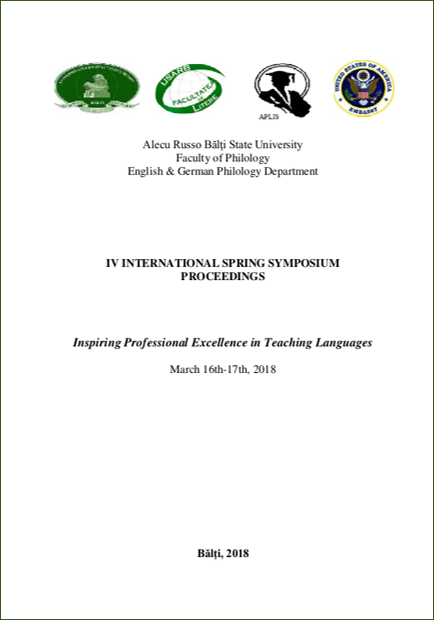TEACHING AND LEARNING ENGLISH CAN BE DIFFERENT: INTRODUCING NEW METHODOLOGY CURRICULUM
TEACHING AND LEARNING ENGLISH CAN BE DIFFERENT: INTRODUCING NEW METHODOLOGY CURRICULUM
Author(s): Olena Bevz, Alla Gembaruk, Oksana Zabolotna
Subject(s): Social Sciences, Language and Literature Studies, Education, Foreign languages learning, School education, Pedagogy
Published by: Biblioteca Ştiinţifică a Universităţii de Stat Alecu Russo
Keywords: new methodology curriculum; New Generation School Teacher Project; British Council Ukraine; Ministry of Education and Science of Ukraine; baseline study, Curriculum design; Project monitoring;
Summary/Abstract: The article presents the main stages of introducing new methodology curriculum designed within New Generation School Teacher Project. The Project is an innovative initiative supported by British Council Ukraine and Ministry of Education and Science of Ukraine (since 2013). The article gives an outline of the following project stages: baseline study, study visits, the Curriculum design, piloting the Curriculum, and the Project monitoring. The baseline study (2013-2014) proved the necessity for the change in pre-service teacher education. The study visits to University of Modern Languages (Tashkent, Uzbekistan) and Norwich Institute of Language Education (Norwich, England) (2014) gave the possibility to observe and study the best practices of English teaching methodology. The Curriculum design stage (2014–2015) became the way of introducing innovative approaches, content, modes of teaching and learning, modes of interaction and new place of school experience into the programme of Preservice teacher training. The piloting stage that embraced 10 Ukrainian pedagogical universities gave the possibility to implement the Curriculum innovations in the methodology course. The Project monitoring (2016-2017) was based on students’ online questionnaires, project team members’ monitoring visits which included meetings with rectors, deans, heads of the departments, methodology teachers; students’ focus group discussion, demonstration lesson analysis. The Project monitoring programme provided data for evaluating the first year results. The results supported previous hypothesis that the introduction of the new curriculum would have a positive influence on the students in terms of developing 21st century skills as well as their motivation to choose teaching as a career.
Book: IV International spring symposium proceedings
- Page Range: 22-32
- Page Count: 11
- Publication Year: 2018
- Language: English
- Content File-PDF

